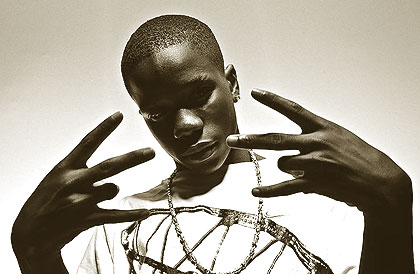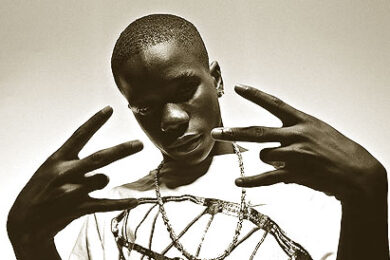When Tinchy Stryder, chart-topping MC wunderkind, started appearing in public arm-in-arm with Liberal Democrat shadow health secretary Norman Lamb, eyebrows weren’t just raised; they were disappearing from foreheads altogether.
Lamb is the father of one half of Tinchy’s management label, but still, why was this bona-fide pop star popping into the House of Commons? Why was he rubbing shoulders with MPs when their stock is arguably at an all time low? Was he there to tell the pen-pushers how things should be done?
Apparently not. When The Quietus inquired about Tinchy’s political views, his response was simple. "No way", he scoffed.
Regardless, The Quietus pressed on and asked Tinchy to discuss his upcoming album Catch 22, which is released on August 17, his strange dual existence as a hotshot MC and university student, and middle-class preconceptions of rap…
You grew up in Bow, East London, which is a bit of a breeding group for UK MCs. You, Dizzee Rascal and Wiley all started out there. What is it about the area that produces so many MCs?
Tinchy Stryder: I think it’s the food we eat. [Laughs]. No, I’m joking. I think it’s just one of those things…I mean, in the area, for a lot of people music is their first thing. It’s the first thing they do. People in other areas might just wanna do things like play football, but here it’s music. It’s part of the culture. People just wanna MC. I grew up at the same time as Dizzee, we started together – Wiley was a bit older, part of a different generation, but it’s basically the same scene, yeah.
So how did you get into MCing? You started out at a young age; isn’t it hard to have the dedication to get better?
TS: Yeah yeah, definitely. I started out just doing it as a hobby, something to do down the youth clubs and that, when I was in my first year of secondary school. And then when I was 13 I started to get on pirate radio and stuff so it just started to get a bit more serious. I started to put in a lot more practice, especially when more people started listening to me.
What kind of things would you rap about back then?
TS: What did I rap about? Oh, everything that was happening to me and around me, you know? It wasn’t as serious as it is now. It was a lot more rose tinted, like things are when you’re younger. Things you talk about, things you want, things you want but you know you can’t have. Or some things you just don’t have any idea about. Those sorts of things.
You have Ghanian heritage. Did that have an influence on your music?
TS: Maybe naturally, without ever realising it, yeah. The music that my mum would listen to would be Ghanian and it would have a really distinct beat and rhythm to it. I think that maybe seeped into it. But it’s definitely without realising it. It’s unconscious.
A lot of the publicity surrounding you is to do with your relationship with Norman Lamb, the Liberal Democrat LP who, in a roundabout way, helped launch your career. How did that come about?
TS: Well, he’s the dad of Archie, who is one half of my management label. He helped fun them when they first set the label up and dropped out of school. That’s where the link is. It’s not like I’m here through some sort of Government scheme or something [Laughs]. No, no.
Do you ever worry about being used as a political tool for credibility?
TS: No…like, by who?
Well, you went to the Houses of Commons with Norman Lamb recently. Do you worry it could be a way for them to get some positive publicity? To prove they’re ‘down with the kids’?
TS: Oh, I see. No, not with that situation. Because the label, and Norman, were behind me from day one, when I didn’t have a deal or anything. They’ve supported me from the start, before any of the press coverage or the reviews or things like that. He likes the music, he’s come to a couple of shows before. I don’t think the credibility thing has anything to do with it.
Are you interested in politics?
TS: No way. Not even, you know?
But your album’s called Catch 22, which is one of the great political works of literature by Joseph Heller…
TS: Yeah, but that was just the situation I was in. I haven’t even read the book. It was personal.
Like being a university student and pop star at the same time?
TS: Definitely. That was something on my mind, yeah.
You said you weren’t political, but what would you do if you were in charge? Imagine Tinchy Stryder has just been elected PM…
TS: [Laughs]. I don’t know, man. I’d give people more opportunities. Most people don’t have enough opportunities to do things, especially where I’m from. Places like Bow, and other similar areas, people there have nothing to do with the day. There should be more things they can do, more things they can work on.
Do you think that the lack of opportunities is why so many Mcs come from your area? Because it’s one of the most viable ways of getting out and achieving something?
TS: Yeah, that definitely could be a reason. But not everyone can get up and be an MC. There has to be other things you can do, and at the moment it’s too limited. It can’t just be being an MC or footballer or basketball player. People think they’re the only options and it shouldn’t be that way.
So let’s talk about Catch 22. How would you describe it?
TS: It’s not like a theme album or anything like that. It’s got lots of different things on it. It’s got loads of different experiences and stories, things that have happened to me, on there. It all blends into one. I think that’s the key about it. If you don’t know Tinchy Stryder, the album is a good way of getting to.
So it’s snapshots of your life?
TS: Yeah, yeah. That’s definitely it. I like that. I think I’m going to start using that – snapshots of my life.
You can have that one for free. Catch 22 seems a bit more mainstream than some of your previous stuff, especially with the collaborations and pop singles. Would you agree?
TS: I think it’s definitely more mainstream, especially with some of the singles off it. But at the same time, it’s still got my roots on there. I haven’t lost them, it’s just a case of developing and evolving. You have to do that.
Is that important to you? To hang onto your roots?
TS: Of course. Not because of credibility, but because if you don’t know where you came from, you can’t have any idea of where you should be going. You have to remember where you came from.
Most middle-class people normally use the misogyny stick to batter rap music with, but he lyrics for songs like ‘Take Me Back’ are quite sweet and romantic. Even ‘Number One’, in its own way, is quite heartfelt…
TS: Yeah, to an extent. I mean, there’s much more romantic music out there, especially ‘Number One’. But they may be different to the type of music and attitude that people associate MC’s and rappers with. When you’re making an album there always has to be an angle to reach, and if you’re not experiencing things for real, then it makes it harder to speak bout stuff. Those songs, that’s just what I felt like I had to speak about on that day in the studio.
Talking about attitudes or preconceptions, underneath a recent interview you did with The Guardian, the first person to comment says they’ve never heard a good British rap record. What do you think about that?
TS: Well, I can rap, so I don’t care. Plus, we call it MCing, not rapping.
Do you think that ‘British people can’t rap – we should leave it to the Americans’ attitude is ignorant?
TS: Yeah. But then again, everyone’s entitled to their opinion, you know? If that’s what you believe, then it’s up to you.
We spoke earlier about the dual existence of the pop star/student life. How hard is that?
TS: Well, when I first enrolled into the uni, it obviously wasn’t like it is now. And even recently…I always felt like music was my first thing, you know? It was never a case that I was gonna run myself down at school. There wasn’t much time left so I thought I might as well learn as much as I can, while I can.
It must be hard to drag yourself in for 9 o’clock lectures, though.
TS: [Laughs]. Yeah, definitely.
You’ve become noted for your collaborations, and one of the more recent ones we heard you do was a track for Gang Gang Dance. Do you have anything lined up for the future?
TS: No man, not right now. I don’t have anything planned, truth be told. But Gang Gang Dance, they were cool guys. Very cool guys.
Michael Jackson’s just passed away. Did he have any kind of influence on your music?
TS: That was a sad day, man. A lot of people came up on him. It was a big loss for music. He didn’t influence my music, I looked at him like something that he wasn’t even human, you know? He was that level of superstar. I remember hearing his music in the kitchen and singing and dancing alone.
Ok. Finally, you’re name comes from your lack of height. How short actually are you?
TS: I think I’m about 5 ‘5, 5’6.
That’s not that short. I’m only about 5 ‘8.
TS: You serious? Well, that’s name from a few years ago, you know? I was only like 5’1 when I came up with it. I’ve grown a bit since then.



